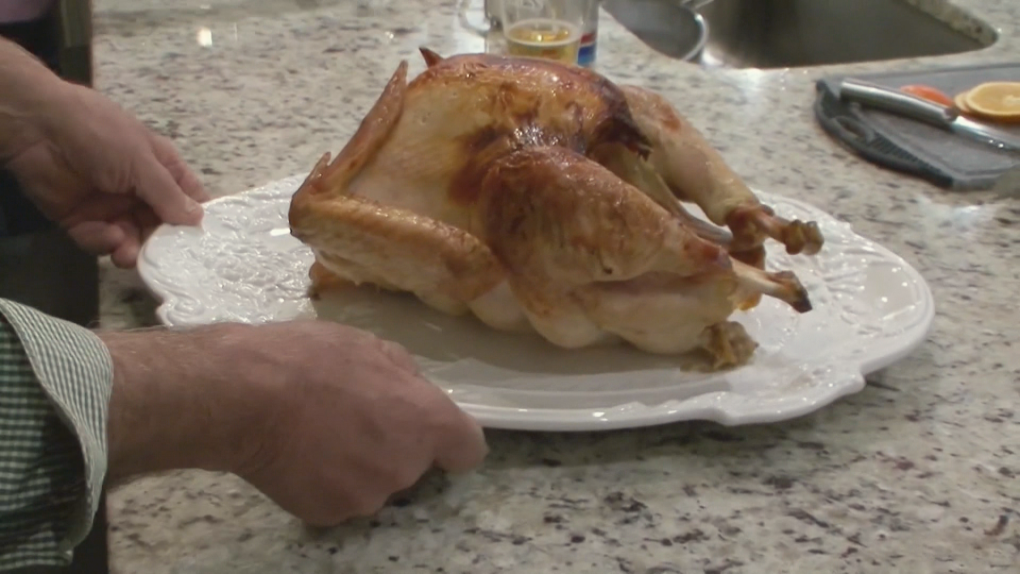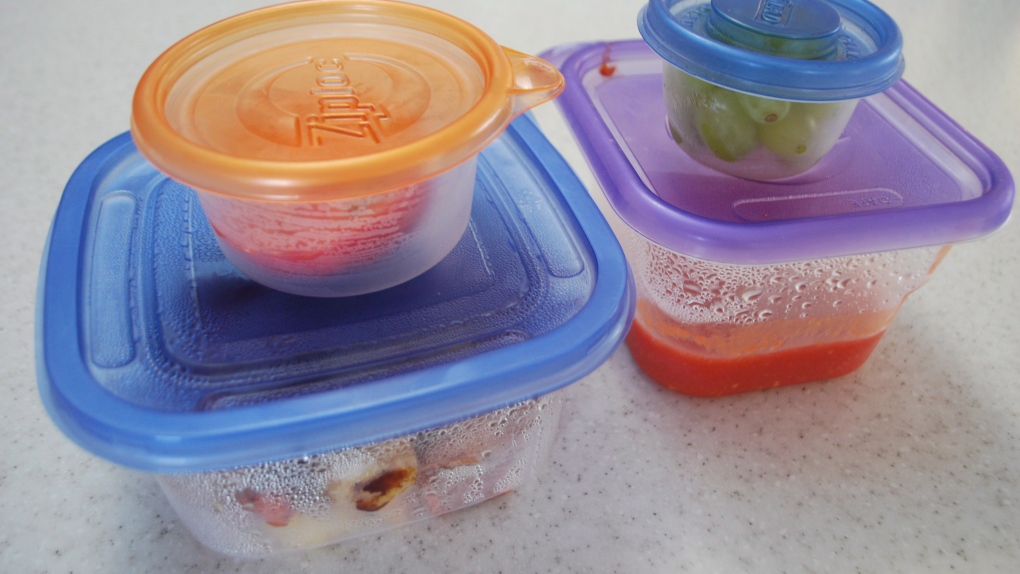'Bacteria will survive': Microbiologist offers tips on making this holiday season food-poisoning free
 E. coli can be found in our gut, as well as in meat or vegetables tainted with contaminated water. Here a microbiologist points out an isolated E. coli growth on an agar plate at the Washington State Dept. of Health Tuesday, Nov. 3, 2015, in Shoreline, Wash. (Elaine Thompson)
E. coli can be found in our gut, as well as in meat or vegetables tainted with contaminated water. Here a microbiologist points out an isolated E. coli growth on an agar plate at the Washington State Dept. of Health Tuesday, Nov. 3, 2015, in Shoreline, Wash. (Elaine Thompson)
Food-borne illness – commonly known as food poisoning – is caused by eating food with germs on it.
Those germs can come from just about anywhere and be spread to just about anything – including your dinner guests.
With many people getting ready to welcome family and friends around the table, here are some tips on how to make holiday feasting as germ-free as possible.
According to the federal government, about four million Canadians get food poisoning each year.
Symptoms of the most common culprits - norovirus, listeria, salmonella, E. coli and campylobacter – include diarrhea, vomiting and fever.
"If you buy this wonderful turkey for Christmas, you have a 20-per-cent chance of the turkey being contaminated with salmonella and a 40-per-cent chance of the turkey being contaminated with campylobacter," said Dr. Michael Gänzle, a professor of food microbiology at the University of Alberta.
Turkey, like all raw meat, poultry, eggs and fish, is one of most common sources of germs that cause food poisoning.
Veggies don't get an automatic bill of health either, as they can carry harmful microbes from contaminated water used to irrigate or wash them.
Even cooks themselves pose a risk, as E. coli and salmonella are carried in the human intestinal tract and staphylococcus lives on skin, and in the nose and throat.
 Microbiologist Dr. Michael Gänzle said raw turkeys have a 20-per-cent chance of carrying salmonella and a 40-per-cent chance of being contaminated with campylobacter, both of which can make you sick if the meat is not cooked and stored properly. (Evan Kenny/CTV News Edmonton)
Microbiologist Dr. Michael Gänzle said raw turkeys have a 20-per-cent chance of carrying salmonella and a 40-per-cent chance of being contaminated with campylobacter, both of which can make you sick if the meat is not cooked and stored properly. (Evan Kenny/CTV News Edmonton)
But these risks can be easily mitigated, Gänzle explained, with good cooking hygiene.
That includes:
- always handling raw meat separately;
- using separate cutting boards and utensils for raw and ready-to-eat ingredients;
- washing hands with warm water and soap for 26 seconds after touching raw meat or eggs; and
- using a thermometer to ensure meats are cooked to appropriate temperatures.
"Many ovens come with a temperature probe that you can use to monitor whether the temperature has been reached. If the interior is at 71 C then all vegetative bacteria have been killed," Gänzle said.
"After the turkey is roasted, keep it hot until it's eaten and after the meal, make sure that it gets into the fridge within four hours."
Leftovers
Gänzle said food that's been packed away properly within four hours should last up to a week in your fridge.
However, cool things down too slow or leave them out too long, and you may be putting yourself at risk.
"Spores of bacteria will survive the cooking process. Some of them grow extremely fast," he explained.
"Longer than four hours is sufficient for a single spore hiding somewhere on the roast to grow to more than a million cells, which then can cause disease."
Alberta Health Services (AHS) said refrigerators should be kept at 4 C or lower, as bacteria multiply quickly in the "danger zone" between that and 60 C.
While reheating some dishes to 70 C is enough to kill any bacteria growing on yesterday's dinner, some plant-based foods like rice and pulses contain bacteria that creates heat-stable toxins that can still make you sick.
"If you buy rice, pulses, any plant material, it's extremely likely that this contains bacillus cereus," Gänzle said, adding staphylococcus aureus (from your nose or hands) also produces heat stable toxins.
"But refrigeration safely prevents growth of the organism."
 Covering food while still hot can trap heat and lengthen the amount of time food is in the "danger zone" where bacteria thrive. Instead, cool food on the counter (for up to four hours) or in the fridge before covering. (Megan Cole)
Covering food while still hot can trap heat and lengthen the amount of time food is in the "danger zone" where bacteria thrive. Instead, cool food on the counter (for up to four hours) or in the fridge before covering. (Megan Cole)
That being said, don't rush to get those leftovers in the fridge – too many hot dishes can raise the inside temperature and put food inside in the danger zone.
AHS's best practices for packing up include transferring food out of deep dishes or pots into shallow containers.
Big pieces of meat can be cut smaller to store, and food should be left uncovered until it's cool.
An ice bath can help bring those big batches of Boxing Day turkey soup down to temp in a hurry, too.
AHS explains that food with harmful germs or toxins may look, taste and smell normal, so don't trust the sniff test.
To help know if your snack is safe, AHS recommends cooling food from 60 C to 20 C within two hours, and from 20 C to 4 C within four hours.
With files from CTV News Edmonton's Evan Kenny
CTVNews.ca Top Stories

Montreal man died of aneurysm after waiting 6 hours in ER
A 39-year-old Montreal man died of an aneurysm after spending six hours in an emergency room before giving up and going home.
Racy photos of Bashar Assad discovered after his fall spark ridicule
Bizarre and personal photos of ousted Syrian President Bashar Assad have surfaced from his abandoned residences, sparking ridicule among Syrians who only until recently were persecuted for criticizing his leadership.
Kennedy’s lawyer has asked the U.S. FDA to revoke its approval of the polio vaccine
U.S. president-elect Donald Trump has praised the polio vaccine as the 'greatest thing,' but a lawyer affiliated with Trump’s pick to lead the country’s top health agency has petitioned the U.S. Food and Drug Administration to revoke approval of the vaccine used in the United States
National Police Federation raises concerns over Manitoba’s border reinforcement plans
The association representing RCMP officers said it’s concerned about the province’s plans for more overtime to help patrol the border.
'Smoldering myeloma': Breakthrough research could buy time for those at risk of dangerous cancer
Multiple myeloma is an incurable cancer. An estimated 4,000 Canadians are diagnosed each year, according to the Canadian Cancer Society, with an average survival of eight years after diagnosis.
Family, friends and fans to gather at memorial for former B.C. premier John Horgan
Thousands are expected to gather at an arena today in Colwood, B.C., to celebrate the life of former British Columbia premier John Horgan.
Romney stands by Trump criticism but says MAGA is now the Republican Party
U.S. Sen. Mitt Romney, a frequent Donald Trump critic who will soon retire from Congress, stood by his criticism of the American president-elect’s character but said Trump and his MAGA movement now define the Republican Party.
Feds should consider scrapping controversial digital services tax amid Trump tariff threats: Morneau
If the Canadian government wants to make headway with the incoming U.S. administration, it should look at scrapping some sticking-point policies, such as the controversial digital services tax, former Liberal finance minister Bill Morneau says.
Canada Post union negotiator balks at labour minister's calling for a 'time-out'
This week, Labour Minister Steven MacKinnon announced a 'time-out' in the ongoing Canada Post strike. In a way, Canadian Union of Postal Workers (CUPW) negotiator Jim Gallant says he agrees with that phrasing.





























